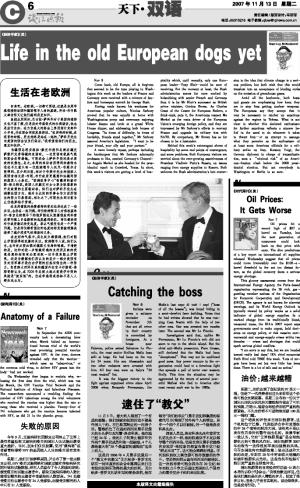Nov 8
Come back, old Europe, all is forgiven: that seemed to be the tune playing in Washington this week as the leaders of France and Germany were received with a mixture of fanfare and homespun warmth by George Bush.
Having made known his weakness for American popular culture, Nicolas Sarkozy proved that he was equally at home with Washingtonian pomp and ceremony: enjoying lobster bisque and lamb at a grand White House dinner, and addressing both houses of Congress. “In times of difficulty, in times of hardship, friends stand together,” Mr Sarkozy assured America's legislators. “I want to be your friend, your ally and your partner.”
A more homely repast, perhaps including the hamburgers that Mr Sarkozy adamantly professes to like, awaited Germany's Chancellor Angela Merkel as she headed for the presidential ranch in Crawford, Texas. In short, this week's visitors are getting a level of hospitality which, until recently, only one European leader—Tony Blair—could be sure of receiving. For the moment at least, the Bush administration seems far more excited by hobnobbing with senior French and Germans than it is by Mr Blair's successor as British prime minister, Gordon Brown. As Charles Grant of the Centre for European Reform, a think-tank, puts it, the Americans respect Ms Merkel as the main driver of the European Union's emerging foreign policy, and they are impressed by Mr Sarkozy's efforts to reorient France and upgrade its military ties with NATO. By comparison, Mr Brown has so far chosen to be a bystander.
Behind this week's extravagant shows of hospitality lay some real points of convergence, and some problems. Both European visitors are worried about the ever-growing assertiveness of President Vladimir Putin's Russia, on issues ranging from energy supplies to Kosovo. Both welcome the Bush administration's late conversion to the idea that climate change is a serious problem, but both wish that this would translate into an acceptance of binding curbs on the emission of greenhouse gases.
Amid all the bonhomie, both hosts and guests are emphasising how keen they are to stop Iran getting nuclear weapons. The Europeans say they accept that it may be necessary to ratchet up sanctions against the regime in Tehran. What is not clear is whether this declared enthusiasm for further sanctions reflects a sincere belief in the need to do whatever it takes to thwart Iran—or an attempt to assuage what they perceive as the enthusiasm of at least some American officials for a military strike on Iran. Karsten Voigt, the German diplomat in charge of transatlantic ties, sees a “minimal risk” of an American-Iranian clash before the 2008 presidential election. But not everybody in Washington or Berlin is so sure.

